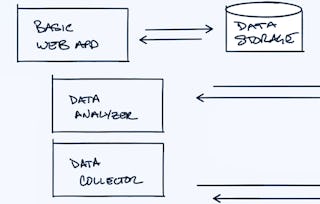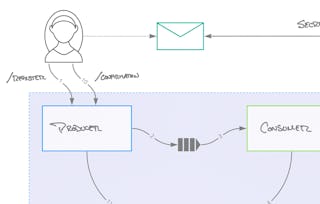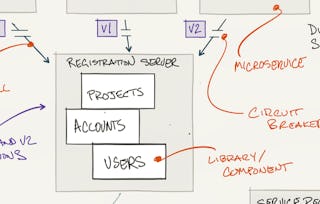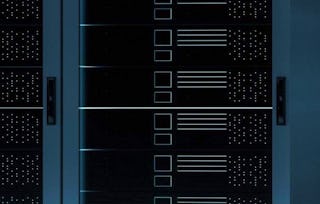The course is intended for individuals looking to understand the basics of software engineering as they relate to building large software systems that leverage big data. You will be introduced to software engineering concepts necessary to build and scale large, data intensive, distributed systems. Starting with software engineering best practices and loosely coupled, highly cohesive data microservices, the course takes you through the evolution of a distributed system over time.

Fundamentals of Software Architecture for Big Data

Fundamentals of Software Architecture for Big Data
This course is part of Software Architecture for Big Data Specialization


Instructors: Tyson Gern
11,440 already enrolled
Included with
90 reviews
Recommended experience
What you'll learn
Practice software engineering fundamentals; test first development, refactoring, continuous integration, and continuous delivery.
Architect and create a big data or distributed system using rest collaboration, event collaboration, and batch processing.
Create a performant, scalable distributed system that handles big data.
Skills you'll gain
Details to know

Add to your LinkedIn profile
6 quizzes, 5 assignments
See how employees at top companies are mastering in-demand skills

Build your subject-matter expertise
- Learn new concepts from industry experts
- Gain a foundational understanding of a subject or tool
- Develop job-relevant skills with hands-on projects
- Earn a shareable career certificate

There are 4 modules in this course
Welcome to Fundamentals of Software Architecture for Big Data. In the first week of this course, you will learn the basics of modern software engineering. You will learn how our industry progresses over time, practice test driven development, and implement widely used data structures.
What's included
7 videos9 readings2 assignments1 peer review1 discussion prompt
In this week you will learn the fundamentals of software architecture. You will learn how to evolve an architecture over time, how to work within a large codebase, and a bit about blockchain.
What's included
5 videos4 readings1 quiz1 assignment1 peer review1 discussion prompt
This week you will learn the fundamentals of monitoring software in production. You will learn how to create reliable background jobs, how to calculate and communicate service availability, and how to implement production metrics and monitoring.
What's included
1 video2 readings2 quizzes1 assignment
In this last week of the course, you will learn the fundamentals of production quality databases and messaging systems. You will understand the tradeoffs between consistency and availability, how to implement database transactions to improve consistency, and how to implement messaging systems to improve availability.
What's included
3 videos4 readings3 quizzes1 assignment
Earn a career certificate
Add this credential to your LinkedIn profile, resume, or CV. Share it on social media and in your performance review.
Build toward a degree
This course is part of the following degree program(s) offered by University of Colorado Boulder. If you are admitted and enroll, your completed coursework may count toward your degree learning and your progress can transfer with you.¹
Instructors

Offered by
Explore more from Software Development
 Status: Free Trial
Status: Free TrialUniversity of Colorado Boulder
 Status: Free Trial
Status: Free TrialUniversity of Colorado Boulder
 Status: Free Trial
Status: Free TrialUniversity of Colorado Boulder
 Status: Free Trial
Status: Free TrialUniversity of Colorado Boulder
Why people choose Coursera for their career

Felipe M.

Jennifer J.

Larry W.

Chaitanya A.
Learner reviews
- 5 stars
37.77%
- 4 stars
21.11%
- 3 stars
15.55%
- 2 stars
7.77%
- 1 star
17.77%
Showing 3 of 90
Reviewed on Oct 19, 2023
Good lectures and code assignments to solidify concepts.
Reviewed on May 25, 2023
Does not go very deep and some exercises doen't really seem to work software architecture concepts, but merely simple coding problems or completions.
Reviewed on Jul 5, 2024
Solid advanced-level course for software architects looking to broaden horizons. The course is challange-based and requires experience with Object Oriented Programming, plus basic experience in Java.

Open new doors with Coursera Plus
Unlimited access to 10,000+ world-class courses, hands-on projects, and job-ready certificate programs - all included in your subscription
Advance your career with an online degree
Earn a degree from world-class universities - 100% online
Join over 3,400 global companies that choose Coursera for Business
Upskill your employees to excel in the digital economy
Frequently asked questions
A cross-listed course is offered under two or more CU Boulder degree programs on Coursera. For example, Dynamic Programming, Greedy Algorithms is offered as both CSCA 5414 for the MS-CS and DTSA 5503 for the MS-DS.
· You may not earn credit for more than one version of a cross-listed course.
· You can identify cross-listed courses by checking your program’s student handbook.
· Your transcript will be affected. Cross-listed courses are considered equivalent when evaluating graduation requirements. However, we encourage you to take your program's versions of cross-listed courses (when available) to ensure your CU transcript reflects the substantial amount of coursework you are completing directly in your home department. Any courses you complete from another program will appear on your CU transcript with that program’s course prefix (e.g., DTSA vs. CSCA).
· Programs may have different minimum grade requirements for admission and graduation. For example, the MS-DS requires a C or better on all courses for graduation (and a 3.0 pathway GPA for admission), whereas the MS-CS requires a B or better on all breadth courses and a C or better on all elective courses for graduation (and a B or better on each pathway course for admission). All programs require students to maintain a 3.0 cumulative GPA for admission and graduation.
Yes. Cross-listed courses are considered equivalent when evaluating graduation requirements. You can identify cross-listed courses by checking your program’s student handbook.
You may upgrade and pay tuition during any open enrollment period to earn graduate-level CU Boulder credit for << this course/ courses in this specialization>>. Because << this course is / these courses are >> cross listed in both the MS in Computer Science and the MS in Data Science programs, you will need to determine which program you would like to earn the credit from before you upgrade.
MS in Data Science (MS-DS) Credit: To upgrade to the for-credit data science (DTSA) version of << this course / these courses >>, use the MS-DS enrollment form. See How It Works.
MS in Computer Science (MS-CS) Credit: To upgrade to the for-credit computer science (CSCA) version of << this course / these courses >>, use the MS-CS enrollment form. See How It Works.
If you are unsure of which program is the best fit for you, review the MS-CS and MS-DS program websites, and then contact datascience@colorado.edu or mscscoursera-info@colorado.edu if you still have questions.
More questions
Financial aid available,

